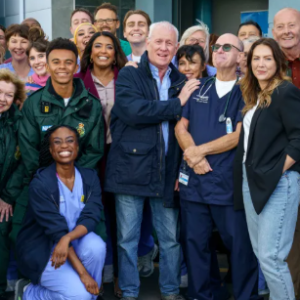In a moment charged with victory and vindication, the air was electric at the BAFTA Awards as Casualty, Britain’s longest-running medical drama, took home the coveted trophy for Best Soap. But behind the glitter of celebration and the flash of cameras, a deeper narrative was unfolding—one that addressed rising fears, public speculation, and the very future of the iconic series.
At the heart of this emotional swell stood Neet Mohan, the actor who has brought life and anguish to Rash Masum, one of Casualty’s most compelling and tormented characters. In an exclusive post-ceremony interview, his words cut through the uncertainty like a scalpel: “As far as I’m aware, we’re not going anywhere.”

With those calm but resolute words, Neet extinguished the wildfire of rumors that had swept through the fanbase—whispers that Casualty might be facing the axe after years of loyal service on the BBC. The actor’s reassurance landed like a defibrillator shock to the heart of the show’s viewership, reviving hope that the corridors of Holby City Hospital would continue to echo with life-and-death drama.
This wasn’t the first time Casualty’s survival had been called into question. Just months before, murmurs of cancellation had grown louder, circulating across tabloids and social media with an ominous drumbeat. The BBC had stepped forward with a statement in March, insisting the show remained on solid ground, but for fans who had seen other soaps perish under similar speculation, the fear lingered.

Now, with a BAFTA win crowning Casualty’s recent run, the victory felt less like a trophy and more like a battle standard raised high. But the celebration was far from hollow—it was purposeful, pointed, and deeply political.
Jon Sen, the show’s executive producer, seized the moment in the BAFTA winners’ room to not only thank the audience and academy—but to deliver a passionate rallying cry for the entire British drama industry. His words resonated beyond Casualty, striking at the heart of what continuing drama means for the future of television.
“What is often overlooked,” Sen declared, “is that the brilliant, high-end drama of tomorrow rests and relies on the vibrant, continuing drama of today.”

There was no mistaking the message behind his statement: long-running dramas like Casualty are more than just entertainment. They are crucibles—furnaces, as Sen put it—where new talent is forged. Actors, writers, directors, technicians—these shows are the proving grounds where future legends are born. And for that future to exist, the present must be protected.
His plea was more than just a defense of Casualty—it was a demand for respect. A call to arms against diminishing budgets, shifting priorities, and the increasing pressure to chase streaming trends over legacy value.
As the glitz of the awards faded into the background, what remained was a hard truth: shows like Casualty are often the unsung scaffolding of an entire industry.
And no one knows that better than Neet Mohan, whose portrayal of Rash Masum has drawn fans deep into a character defined by emotional struggle and moral complexity. Mohan’s journey on Casualty hasn’t just elevated the role—it has reflected the kind of storytelling that builds empathy, educates viewers on mental health and ethical dilemmas, and grounds viewers in the realism of life under fluorescent lights and bloodied scrubs.
So when he looked out at the press, fresh from the BAFTA win, and assured the public that Casualty was not disappearing into television history, it wasn’t just a relief—it was a reaffirmation. A promise.
But the war for Casualty‘s future isn’t over. The BAFTA win is both a celebration and a warning shot. It’s a moment of glory that reminds everyone—from network executives to skeptical audiences—that continuing dramas still have power, still have punch, and still matter.

For the fans who’ve followed Holby’s ED for decades—for those who’ve wept over character deaths, held their breath during tense surgeries, and rooted for Rash Masum’s redemption—this victory is personal. It’s a lifeline. And with it, a question still hangs in the air: What will it take for the industry to value longevity, consistency, and craft over flash-in-the-pan trends?
The stakes are clear. The groundwork for tomorrow’s hit dramas—those future award-winners yet to be imagined—starts here, in the pulse of the present.
So let there be no mistake. Rash Masum still walks the halls. The trauma bays still hum. The heart of Casualty still beats—steady, fierce, and ready for whatever comes next.
And if Neet Mohan’s words are any indication, that heartbeat isn’t fading anytime soon. It’s surging forward.
Because the future isn’t just coming—it’s already here in Holby City.





